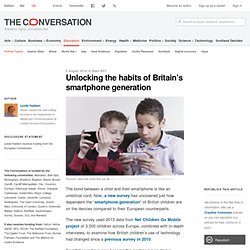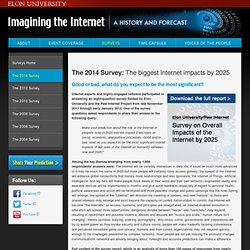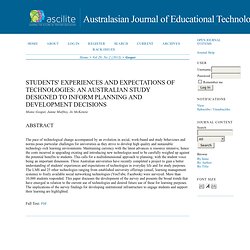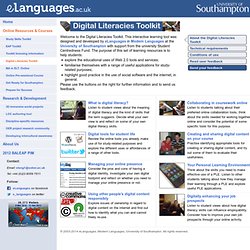

Unlocking the habits of Britain's smartphone generation. The bond between a child and their smartphone is like an umbilical cord.

Now, a new survey has uncovered just how dependent the “smartphone generation” of British children are on the devices compared to their European counterparts. The new survey used 2013 data from Net Children Go Mobile project of 3,500 children across Europe, combined with in-depth interviews, to examine how British children’s use of technology had changed since a previous survey in 2010. Smartphones have now become the most common device through which British children go online: 56% of the 516 British 9-16-year-olds surveyed use them to do so every day. This is more than the European average of 45%. In Britain, the numbers increase with age, as the graph below shows. Click to enlarge PCs still trump for games By comparison with British children surveyed in the 2010 EU Kids Online survey, children’s use of PCs to go on the internet has halved, although laptop access has held up at 47%.
Dependent, but aware of risks. Pew Future of the Internet Survey Report: Experts Predict Internet's Impact by 2025. The 2014 Survey: The biggest Internet impacts by 2025 Good or bad, what do you expect to be the most significant?

Internet experts and highly engaged netizens participated in answering an eight-question survey fielded by Elon University and the Pew Internet Project from late November 2013 through early January 2014. One of the survey questions asked respondents to share their answer to the following query: Make your prediction about the role of the Internet in people's lives in 2025 and the impact it will have on social, economic, and political processes. Good and/or bad, what do you expect to be the most significant overall impacts of our uses of the Internet on humanity between now and 2025? Full content of the survey report, which is an analysis of more than 150 pages of responses from nearly 1,500 survey participants, follows below. < Get the downloadable PDF >. To read the responses from survey participants who took credit for their answers to the question, please click here: - Prof.
Higher Education Expert, Manja Klemenčič. We are experiencing higher education reforms in Europe of unprecedented speed and extent.

Higher education and research are at the forefront of the government policies aiming towards more innovative, more just, and more dynamic societies. Higher education institutions are seen as central players in European knowledge societies. The reforms have had profound implications on all higher education stakeholders, including, and especially, academics, researchers, and students. These developments have energized the field of higher education studies in Europe. In my own research I try to understand the experiences of contemporary students in Europe and the quality of student engagement – student agency - within higher education and beyond. Expert Articles My research on students commenced with interest in student unionism, which I find crucial to understanding the functioning of higher education systems in Europe.
Expert Recommended Articles. Binder-9-reduced. Webinar Recording: Building a Research Agenda using Design-Based Research (DBR) Complete Beginner's Guide to Interaction Design. Interaction design has its origins in web and graphic design, but has grown into a realm of its own.

Far from merely working with text and pictures, interaction designers are now responsible for creating every element on the screen that a user might swipe, click, tap, or type: in short, the interactions of an experience. Newsletter Sign Up Original UX articles Curated Resources. Students' experiences and expectations of technologies: An Australian study designed to inform planning and development decisions. Students' experiences and expectations of technologies: An Australian study designed to inform planning and development decisions Maree Gosper, Janne Malfroy, Jo McKenzie Abstract The pace of technological change accompanied by an evolution in social, work-based and study behaviours and norms poses particular challenges for universities as they strive to develop high quality and sustainable technology-rich learning environments.

Maintaining currency with the latest advances is resource intensive, hence the costs incurred in upgrading existing and introducing new technologies need to be carefully weighed up against the potential benefits to students. eLanguages.ac.uk - digital literacies toolkit. Welcome to the Digital Literacies Toolkit.

This interactive learning tool was designed and developed by eLanguages in Modern Languages at the University of Southampton with support from the university Student Centredness Fund. The purpose of this set of learning resources is to help students: explore the educational uses of Web 2.0 tools and services;familiarise themselves with a range of useful applications for study-related purposes;highlight good practice in the use of social software and the internet, in general. Please use the buttons on the right for further information and to send us feedback. Technical requirements. It's Complicated.